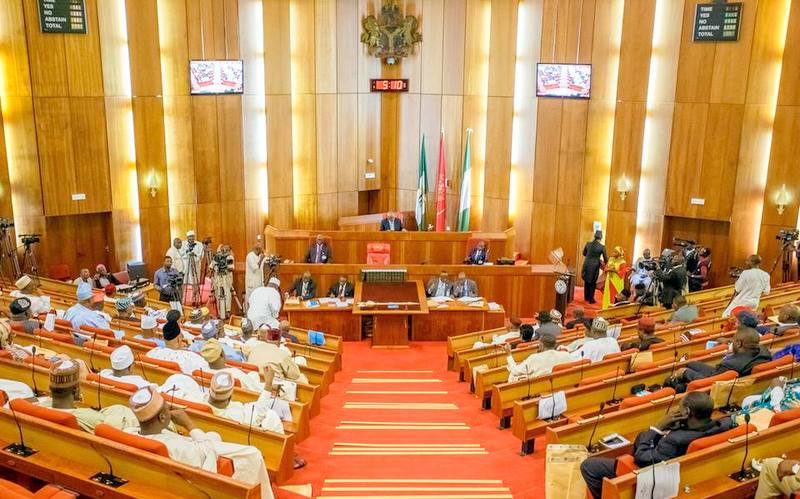This post has already been read 4355 times!
• Saraki orders probe, summons clerk
As stakeholders in the media industry protest against the stringent conditions for covering activities of the National Assembly, the management has withdrawn the controversial accreditation guidelines.
Although no official statement has been released to that effect, it was learnt that the National Assembly Clerk has directed the Information Director, Agada Rawlings Emmanuel, who signed the document containing the guidelines to immediately withdraw it.
The Guardian learnt that a team of National Assembly officials, comprising Emmanuel and other senior staff, has been raised to work out more acceptable guidelines for the accreditation.The Senate President, Bukola Saraki, has ordered an immediate investigation into the drafting and release of the draconian guidelines.
It was also learnt yesterday that in a bid to unravel the circumstances that led to the emergence of the stringent conditions, which have attracted widespread condemnations from several quarters, Saraki has written to the Clerk to the National Assembly, Mohammed Ataba Sani Omolori, to brief the political leadership of the legislature on the matter. According to Saraki, even the Speaker of the House of Representatives, Yakubu Dogara, has denied knowledge of the guidelines.
The statement by Saraki on the need for investigation of the matter reads in part: “The attention of the President of the Senate, Dr. Bukola Saraki, has just been drawn to a story that is circulating on social media about the National Assembly issuing new guidelines to journalists.
“These alleged guidelines have not emanated from either the Senate President or the Speaker, and will be promptly investigated.“The public should note that the 8th National Assembly has been committed to the freedom of the press as exemplified by its work to bringing governance closer to the people through live streams and live tweets.
“The leadership of the 8th National Assembly believes strongly in the freedom of the press and in carrying the Nigerian public along. Hence, the Senate President and all his colleagues will continue to work to ensure that these freedoms remain unhindered.”A group, the Socio-Economic Rights and Accountability Project (SERAP) urged the National Assembly to immediately withdraw the repressive guidelines or face legal action.
SERAP, in a statement by its Deputy Director, Kolawole Oluwadare, said: “Nigerians expect the leadership of the National Assembly to show a greater level of transparency and accountability and to explain and take responsibility for what they are doing rather than implicitly banning journalists from covering their public functions. Implementing the ‘accreditation guidelines’ would allow the lawmakers to escape accountability for their constitutional functions.”
The group urged Saraki and Dogara to “open the windows and let in the daylight of the National Assembly by immediately withdrawing the accreditation guidelines and allowing journalists to freely cover the activities of leadership and members of the National Assembly.” The organisation said it would: “pursue national and international legal action if the unlawful guidelines are not withdrawn by Friday.”The fresh guidelines released by the National Assembly on Monday had stipulated, among others, that each media organisation would submit a copy of its income tax return for the last two years. Also, every newspaper house must show evidence that it circulates at least 40,000 copies daily before qualifying for accreditation.
Other conditions include evidence of certificate of incorporation of the media organisation; evidence of membership of professional bodies for media organisation; proof of membership of Nigeria Union of Journalists (NUJ) with registration number and code of certification from the National Library for the media organisation.
The statement by the legislature also made it clear that “with this new guidelines in place, all previous accreditations granted to journalists covering the National Assembly will lapse with the dissolution of the 8th Assembly.”The conditions also stated that “media houses must be publishing daily and on weekend (Applicable to Online Media).The media organisation concerned must have experience of covering proceedings of the National Assembly for at least two years before applying for permanent accreditation.
The list of conditions continued:
* All online media must have at least 5000 viewership per day, the site must have been in operation for five years and provide satisfactory evidence to this effect with clippings of the news utilised (especially parliamentary news);
• Only television stations with national coverage and specific independent producers with current running programme on the National Assembly will be allowed access into the chambers on a permanent basis (All the production crew will be accredited as entity).
•All correspondents must attach photocopy of letter of appointment of the media organisation on whose behalf request has been received for the grant of accreditation.
[The Guardian]



